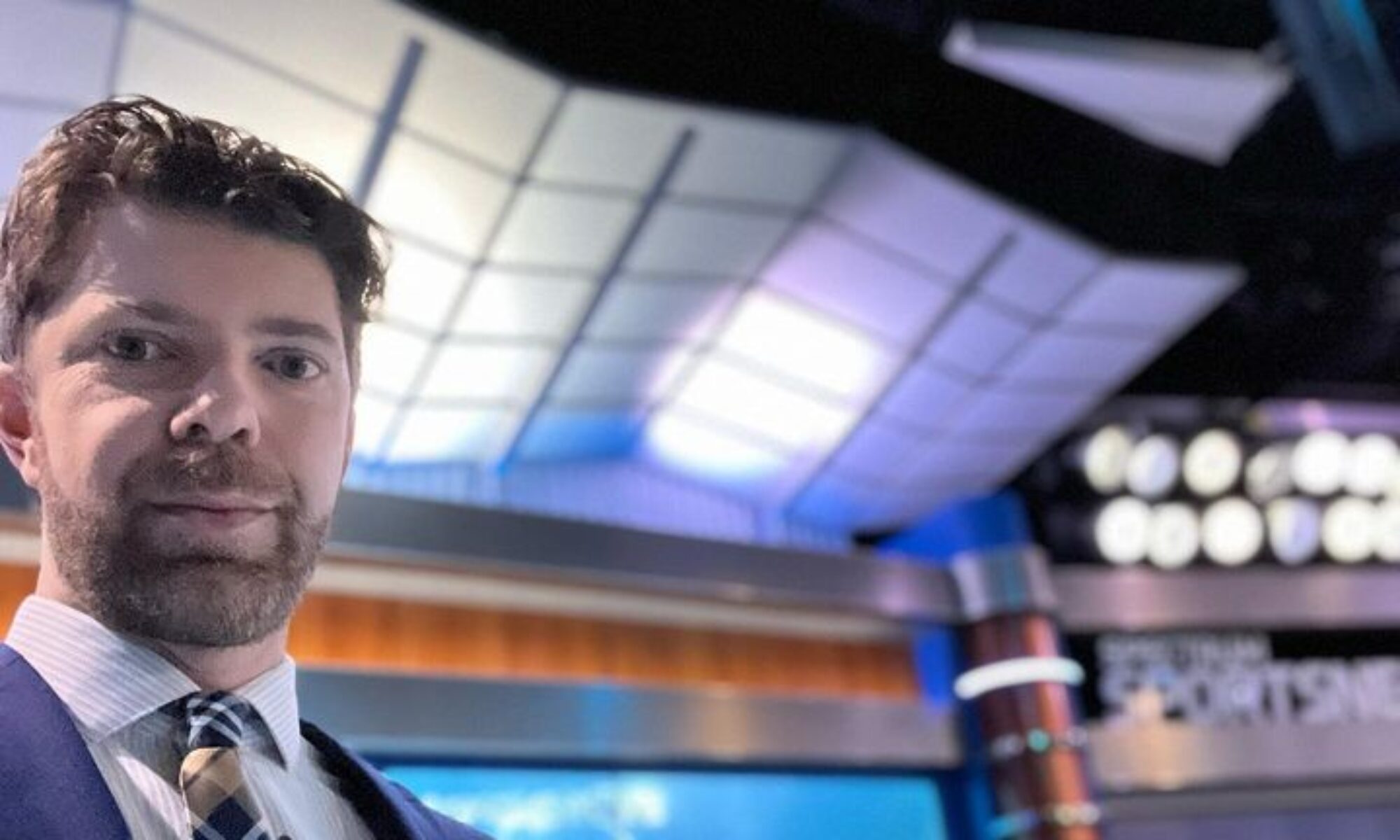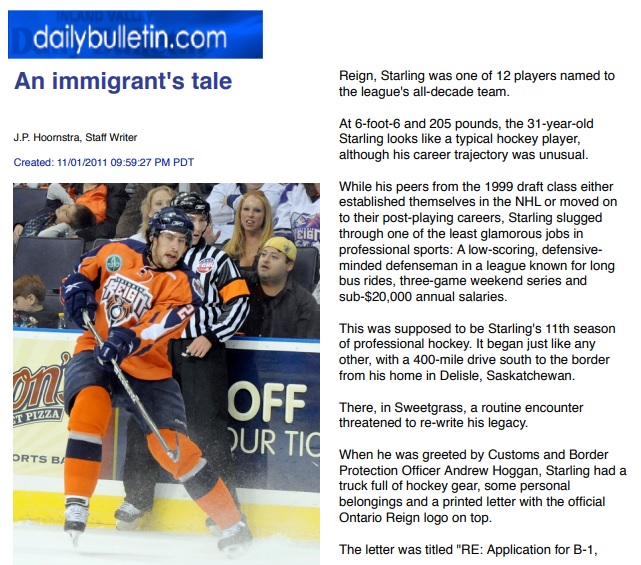This story originally appeared in the Inland Valley Daily Bulletin in November 2011.
The story of Chad Starling’s hockey career already had been written when his pickup truck pulled into the U.S.-Canadian border station at Sweetgrass, Montana early in the afternoon of Sept. 29.
Starling played 503 games in the ECHL between 2000 and 2009, more than any ECHL defenseman during the decade. Last year, his third with the Reign, Starling was one of 12 players named to the league’s all-decade team.
At 6-foot-6 and 205 pounds, the 31-year-old Starling looks like a typical hockey player, although his career trajectory was unusual. While his peers from the 1999 draft class either established themselves in the NHL or moved on to their post-playing careers, Starling slugged through one of the least glamorous jobs in professional sports: A low-scoring, defensive- minded defenseman in a league known for long bus rides, three-game weekend series and sub-$20,000 annual salaries.
This was supposed to be Starling’s 11th season of professional hockey. It began just like any other, with a 400-mile drive south to the border from his home in Delisle, Saskatchewan. There, in Sweetgrass, a routine encounter threatened to re-write his legacy.
When he was greeted by Customs and Border Protection Officer Andrew Hoggan, Starling had a truck full of hockey gear, some personal belongings and a printed letter with the official Ontario Reign logo on top.
The letter was titled “RE: Application for B-1, Visitor for Business Classification, On behalf of Chad Starling.” It began: “This letter is submitted in support of the admission of Chad Starling to the United States in B-1 Status. We have invited Chad to participate in training session with the Ontario Reign that will be held from September 27, 2011 to October 10, 2011 in Ontario, California.”
Hoggan read the brief note, which was signed by head coach Jason Christie. He went to a computer to verify the information by performing a Google search on Starling’s name. Hoggan was not made available for comment but Lynn Hurst, the public affairs liaison for the station, said this is a common practice.
“If someone is claiming to be coming into the U.S. because of trying to get a visa for a sports visa or a work visa, and in order to substantiate their claim, they may Google that person’s name, or Google the team, or the business that they’re planning to work for,” Hurst said.
What Hoggan found was a blog entry on this newspaper’s website, dated July 25, 2011, indicating Starling already had re-signed with the Reign for the 2011-12 season. (Google “Chad Starling” and the blog entry still is among the top results.) This presented a contradiction. The letter stated Starling was invited to participate in training camp, during which he “may engage in contract negotiations.” However, as a simple internet search revealed, a contract already had been negotiated and signed.
To the government, that makes a big difference.
“When an athlete comes in to try out for a team, they’re issued a B-1 visa, which for Canadians, there isn’t any fee associated with that,” Hurst said. “They come in temporarily to try out for the team. Then if they make the team, they have to adjust status to either an H-2 or a P-1.”
Since Starling already “made” the team in the eyes of the government (in this case, a border guard), the B-1 visa wasn’t sufficient. Hoggan filled out the U.S. Department of Homeland Security form for Withdrawal of Application for Admission.
He took Starling’s photo and fingerprint and noted the explanation: “Application withdrawn in order to return back to Canada to either have a P-1 petition or proof that a contract has not been signed.”
It was the first time in 11 seasons Starling had been turned around at the border. “I called (Christie) right after and he said, ‘We’ll get right on that,’ ” he said. “I asked him how long it would take. He said no more than 10 days.”
That sounded simple enough. Ten days and Starling would be back in business. Camp was two weeks long, so this wasn’t a major setback.
Starling was familiar with the organization, the city and the coach; even though Christie was hired by the Reign in August, Starling played for him for five seasons in Peoria and Utah from
2001-06.
Dollars and sense
But why make it difficult? Why would the letter from the Reign request a B-1 visa when Starling needed a P-1?
The answer is simple, but the logic is complicated.
To petition the U.S. government for a P-1 visa costs money – $325 to be exact, although that $325 won’t get you very far. Bob Hoffman, director of communications for the Central Hockey League, said each P-1 petition “ends up in a stack of papers. We’ve heard stories before of people waiting two months (to get their P-1 approved). None of our teams take that risk. Premium processing is more but it puts the paper at the top of the stack.”
That’s why hockey teams at every level – the NHL, ECHL and CHL – pay an additional $1,225 Premium Processing Service fee. The P-1 then gets processed within 15 calendar days; if not, U.S. Citizenship and Immigration Services guarantees a refund.
The Premium Processing Service can be applied to multiple P-1 petitions. So, for example, if a team has 10 players who need P-1 visas, the team can put all 10 names on a list and pay the $1,225 fee once. In the cost-conscious world of minor league sports, that means a lot.
Hoffman said the Central Hockey League has a policy of filing the petitions, and paying the extra fee, for all its P-1 eligible players 15 days before training camp begins – typically on Sept. 15 – so that each P-1 is processed in time for camp. The league also keeps an immigration attorney, Christi Hufford, on retainer to monitor the immigration status of every player.
“Once we caught an issue 10 minutes before game time with an emergency backup goaltender,” Hoffman recalled. “He had work authorization in a field other than hockey. If he had taken the ice to play hockey, he would have been technically breaking the law, so he didn’t play.”
The ECHL has a different policy.
“It’s standard procedure for players crossing the border for camp to ask for a B-1,” said Joe Babik, the league’s Director of Communications. The Reign apparently were abiding when Starling handed over the letter in Sweetgrass. This policy allows ECHL teams to save money, in case a non-tryout player who needs a P-1 visa is deemed expendable during training camp and is released before playing in a game.
The policy produced a letter stating “the purpose of the tryout is to introduce Chad to the team and to learn more about him while providing him with the opportunity to get to know the Ontario Reign organization.”
The blog entry on insidesocal.com Hoggan read while Starling waited in his pickup truck showed that, three months earlier, the defenseman had “re-signed for an unprecedented fourth season in Ontario.”
It was this apparent contradiction of facts that got Starling turned around at the border. But this isn’t the reason he never made it to California.
Bad luck
Sure enough, within 15 days after Starling was turned around at Sweetgrass, his P-1 visa petition was approved. But a lot can happen in 15 days.
Four more defensemen whom the Reign signed in the offseason were unable to play. Adrian van de Mosselaer contracted mononucleosis. Jason Fredricks and Pat Bowen went down with knee injuries. Jordan Hill got a tryout with the Manchester Monarchs of the American Hockey League and earned a contract in training camp.
Starling called Christie on the evening of Thursday, Oct. 13, one day before the Reign’s first regular-season game.
“He said, ‘We got your papers done.’ He said, ‘We need you to leave first thing tomorrow,’ ” Starling recalled. “I told him, ‘Well, I might not be able to leave until Saturday morning because I had a full day of work planned Friday.’ “
Starling said he would call Christie back once he knew he could get the day off. He did. Christie didn’t answer. Starling left a message.
The season began as scheduled as the Reign lost their first game and won their second. Starling was added to the opening-day roster and officially went on 7-day injured reserve. A classic game of phone tag played out behind the scenes.
“I got up Friday morning, called, but (Christie) didn’t answer, so I left another message,” Starling said. “I went to work. He didn’t call back Friday. He called back Tuesday at 11 o’clock in the morning.”
Out of necessity, Christie had been working the phones to find defensemen to replace Hill, van de Mosselaer, Fredricks and Bowen. By the time he did, one week into the season, Starling was eligible to come off injured reserve.
Then another roadblock emerged: There was no more room for Starling in Ontario.
“We kind of have (limited) cap room there and there’s apartments,” Christie said on Oct. 20. “We’re only allowed so many apartments and it’s hurting us because we’ve got so many guys injured. That’s the way the ball rolls sometimes with these injuries. We’ve got to make sure we’re going to be on top of it.”
The next day, Starling was released.
Christie said it wasn’t easy.
“At the end of the day it comes down to money, the cap, not being able to have space,” he said. “We have to make sure we have the right budget. Coming in late like this, missing last season (Starling missed the final four months with groin injuries), it was something where a decision had to be made. For me it was a hard one because I know him. You never like to see that, especially when you have a relationship.”
The feeling was mutual.
“They never did send me any papers so I could leave,” Starling said. “To have it end like this, sour grapes, that sucks. But that’s the way it goes.”
Hard lesson learned
Starling still is in Delisle working for his family-owned business, “cleaning out septic tanks, car washes, any kind of waste basically,” in a rural nook of Saskatchewan. He is an unsigned free agent and is comfortable calling it a career.
“You never say never, if somebody needs a D-man,” he said. “My plan was to take over my parents’ business. Now I just speed the plan up six months.”
Starling said he has no hard feelings toward his teammates. He’s convinced the discrepancy between the letter he was given by the team, and the letter of the law, is the reason he’s still at home.
Christie acknowledged if Starling hadn’t gotten turned around at the border, “this probably never would have happened.”
So something needs to change.
The ECHL can adopt an airtight immigration policy, maybe one similar to the CHL’s. Maybe the Department of Homeland Security can relax P-1 fees for minor-league sports teams who must pay the same amount as their major-league brethren.
Last week, Starling sent the following text message: “Well hopefully if u [sic] get this story done it will stop players in the future to have to go through what I did.”
For now, his legacy remains only partially re-written.

